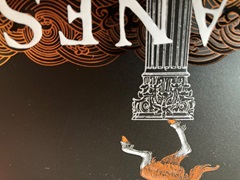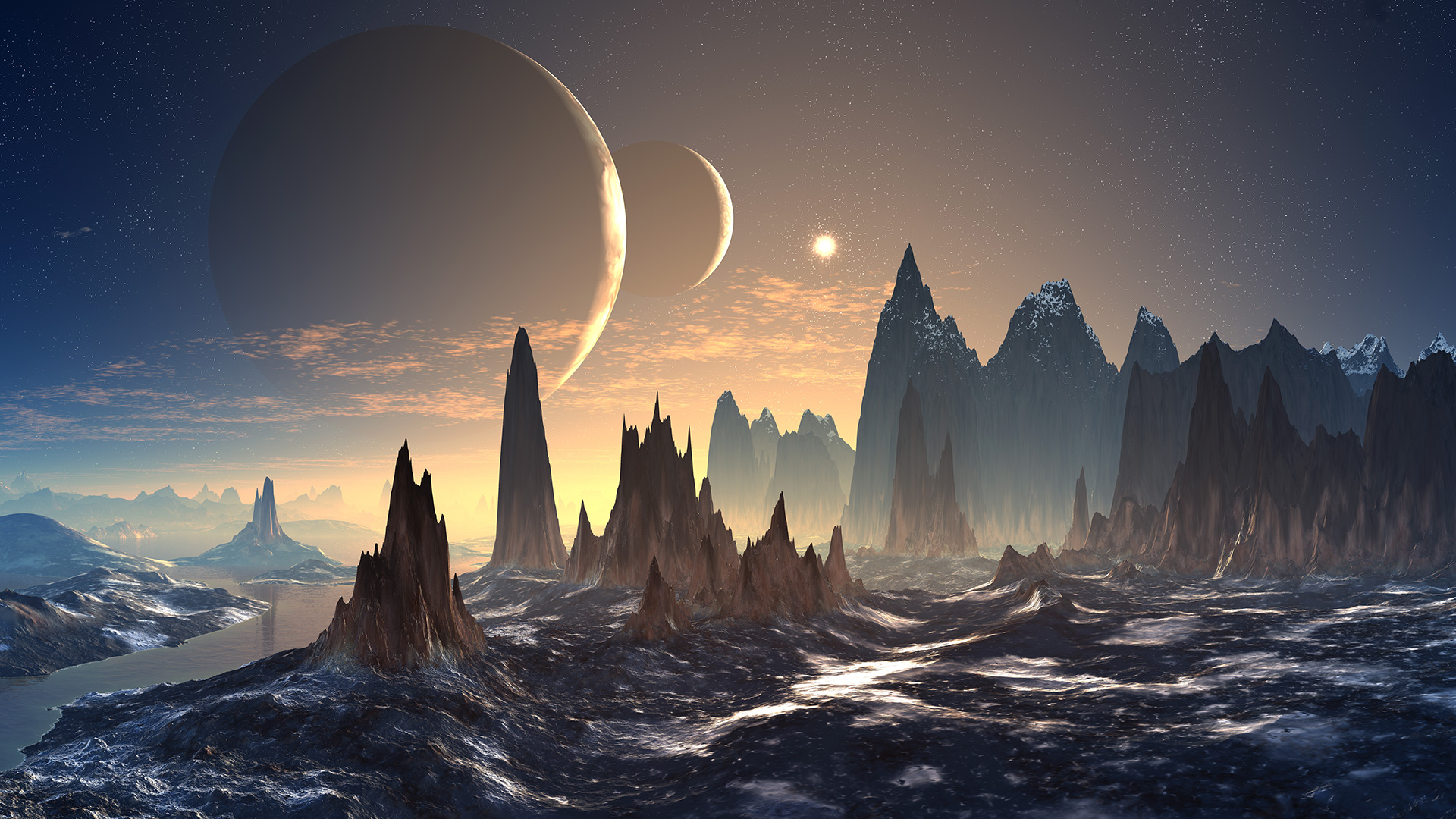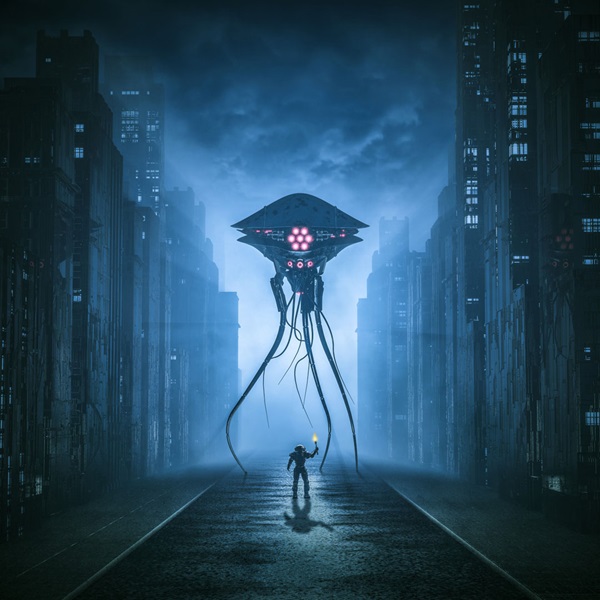
Two books for 2022
Piranesi. The Promise. Entangled Life. Destiny Disrupted | Choose two | Issue 20 | 2022


The essayby Nick Grandage
It seems obvious to me that the universe is utterly pointless. Of course it is. The universe is in the same way that gravity is. There’s no point to gravity. It has no purpose. We don’t have a purpose either. Our existence in the world is the result of millions of chances. I don’t have a problem with that, nor do I have a problem existing in that universe. I am human, and part of what it is to be human is to accept that.
that’s the setting:
now comes the dilemma
I’m not arguing that there’s no morality. But our moral code is up to us.
It can be hard to explore that morality in the context of the terrestrial world. It’s too difficult. So I’m going to take it off world.
The idea that we are alone in the universe has always struck me as being unlikely in the extreme. The first contact by humans with an alien species is a common trope in science fiction, and for good reason. Maybe, they’re coming for us; and we are advertising our existence—think about the Voyager programme and all the radio waves pumped into space. This could be a really big mistake.
Liu Cixin shows us brilliantly what can happen when humans encounter aliens in The Three Body Problem and they turn out not to be benign. The Mote in God’s Eye is another brilliant example.
There is a decision to be made when you encounter an alien species: do you a) exterminate it, because the nature of civilisation is to expand, threatening others or b) come up with another solution? The civilisation that is more advanced will always have to decide whether to exterminate the one that represents a threat.
That’s not the only knotty problem. Spielberg’s A.I.—imperfect as it is, flawed as it undoubtedly is—is about the moral obligations of the creator towards its creation. That’s where ‘we’ are the creator. Theologians will tie themselves in knots over this one. But we don’t have time to get into the intricacies.
not when conflict arises, and it always does,
on the heels of the dilemma
We are a million miles from actual artificial intelligence; and who knows whether there will ever be such a thing. But shouldn’t we be ready for it? Artificial intelligences might have a very different view of the world from ours. Look at Neuromancer; The Matrix; The Terminator; I, Robot—not the film, the book, by Asimov. There’s an argument to say that I, Robot is the most important book in the context of the next hundred years of human existence. Asimov set out the laws that govern the way that a robot should behave. Of course, in Alien those laws get broken pretty much left, right and centre.
It comes down to the control over our lives. Who gets to decide? And who, or what, do we have to kill to ensure our survival?
face the truth
Science fiction talks about what it is to be alive and what life itself is.
Traditionally, it was viewed as a fiction that envisages a science of ‘whatever’ that doesn’t currently exist. Never Let Me Go by Kazuo Ishiguro is science fiction. That science doesn’t exist. But the whole premise of Ishiguro‘s deeply disturbing story is coherent. That’s the measure of a true work of science fiction: you’ve got to create a universe where the things that naturally follow from that, naturally follow. The science may be a little out of this world but that’s okay as long as it makes sense on its own terms. It is a matter of suspending your disbelief.
And it’s not all about the science. Star Wars isn’t about ‘science’. Star Wars is King Arthur. It’s the oldest story written, you could say. That’s the beauty of science fiction: it tackles themes as old as the hills. It frees up the writer and the reader. Look at Foundation; that’s a Noah’s Ark story. Dune is the Wars of the Roses. Shakespeare’s Tempest, that’s science fiction. Midsummer Night’s Dream, maybe. And Margaret Atwood—is she a science fiction writer? Of course she is! Just read Oryx and Crake. She is also a literary goddess. The two can co-exist.
So, what about the spacecraft? If we’re dealing in stereotypes and dead ends, let’s knock that one on the head. The spacecraft are there simply as vehicles for the story. They enable humans—by means of interstellar travel or whatever—to get to the other planet or to the encounter that’s waiting for them. The spacecraft construct the story that’s going to be told.
Suspend your disbelief. Accept the premise and read it on that basis. Read Ursula LeGuin‘s The Left Hand of Darkness, addressing issues of gender—the science fiction element simply sets up the premise to tell a story that couldn’t be set on earth.
And if you just want to kick back, go to the movies and watch Galaxy Quest, in which humans outdo themselves. (Okay, it’s a spoof movie, a send-up of Star Trek. But it is wickedly funny about all of the science fiction tropes.)
face the enemy
and encounter the dystopian world view
But seriously. If somebody doesn’t agree with us, we shoot them. That’s the way it feels right now in some parts of the world—our world, the one we’ve made. That’s our own dystopian back yard.
There is a lot of dystopia in science fiction. Many influential twentieth-century authors were writing in a period where dystopia looked like it was happening or was about to happen: post war, post nuclear, post revolution and political upheaval. Science fiction typically reflects the concerns of the time. You could say that Bladerunner is a prediction of an apocalyptic post climate change future. Read The Drowned World by J G Ballard.
Science fiction writers do tend to be grungier than real world writers. I’d certainly rather live in this world than the Bladerunner world. But as for a ‘perfectly ordered world’: I don’t believe in it. The Matrix was living proof of that. In all my reading, I haven’t encountered a world that I would rather live in than this one, the one we have.
learn to see through masks and disguises
Don’t be fooled. Alien is not a science fiction film: it’s a ‘ghost in the attic’ movie. You can’t open the curtains on board the Nostromo. There is no escape.
Not everything is what it seems. But this one is: it's a brilliant film, made in the last decade, a film that examines all the things I’ve been talking about, what it is to be human. Start by watching Ex Machina.
That’s if you have decided that you can trust me, of course. Does science fiction only appeal to a particular mindset? I don’t know. But it’s probably time I revealed myself to you.
always know who, or what, you’re dealing with
I saw Star Wars a few days before my eleventh birthday, at the cinema. It was like nothing I had ever seen before.
I come from quite a literary family; my mother was an editor. She read The Lord of the Rings to us out loud and introduced me to Brave New World and 1984 and Animal Farm. In my teens I read all the science fiction classics: Foundation, Dune, I, Robot, Rendezvous with Rama, a lot of Asimov, Arthur C Clarke. I watched Bladerunner. I liked it all.
I’ll never stop reading fiction. I find histories and biographies pretty dull. I like thrillers. I like spy novels. I do like order and structure. I’ve got quite an analytical mind. I’ve certainly got a short attention span. I’ve also got an obsessive side (as many of us lawyers do) and an uncannily retentive mind for detail.
That’s me.
As you can tell, I’m human.
prepare to meet your end
You only have to read the late, great Elmore Leonard’s Get Shorty to see that endings are difficult. Or watch the movie.
Let’s end where we began. The universe is utterly pointless. But it’s fair to say that science fiction has given some meaning to the universe, for me. But then, this is one of the wonderful things about literature: people who are widely read—the more points of view you have had to consider—well, that informs your life, doesn’t it? So is the universe utterly pointless? Not from where I’m looking.


Piranesi. The Promise. Entangled Life. Destiny Disrupted | Choose two | Issue 20 | 2022

James Reid. Sacha de Klerk. Nicola Liu. Andrew Robinson. On the subject of shoes.| Issue 20 | 2022
© Norton Rose Fulbright LLP 2026